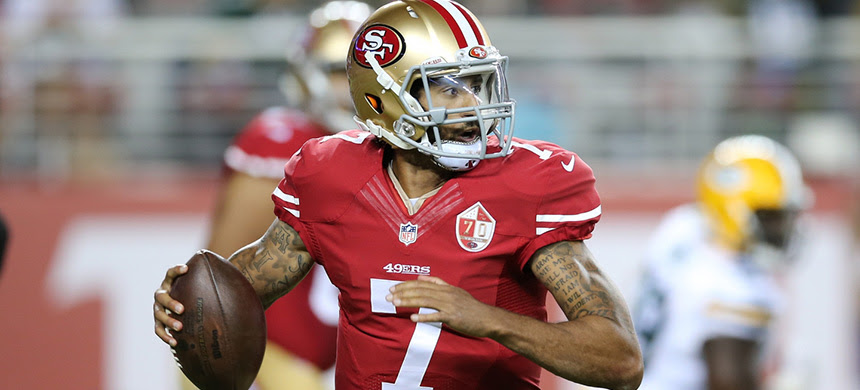By Herb Boyd
In one way Colin Kaepernick, the San Francisco 49’ers quarterback, brought to mind the courageous act of Rosa Parks, who chose to sit rather than move to the black section of the bus.
Kaepernick took a stand by keeping his seat last Friday when the national anthem was played. His defiance is also reminiscent of the black-gloved fist to the air by Tommie Smith and John Carlos as they stood on the victory stand at the 1968 Olympics in Mexico City.
When asked about this, Kaepernick said: “I’ll continue to sit. I’m going to continue to stand with the people that are being oppressed. To me this is something that has to change. When there’s significant change and I feel like that flag represents what it’s supposed to represent, and this country is representing people the way that it’s supposed to, I’ll stand.”
Like the political gestures of Parks, Smith and Carlos, the football player has been hit with a barrage of disgust on the social media outlets as well as from other NFL stars, such as the New York Giants wide receiver Victor Cruz.
“I think, personally,” Cruz told the press, “the flag is the flag. Regardless of how you feel about the things that are going on in America today and the things that are going on across the world with gun violence and things like that. You’ve got to respect the flag and stand up with your teammates. It’s bigger than just you, in my opinion. I think you go up there. You’re with your team, and you pledge your allegiance to the flag and the national anthem as a team, and then you go about your business, whatever your beliefs are. Colin is his own man. He decided to sit down and sit out and that’s his prerogative. But from a personal standpoint, I think you have to stand out there with your team and understand that this is a game and understand that what’s going on in the country.”
Cruz’s comments are mild compared with some of the responses that have come from all quarters of the land. Many of them from people who are incensed by Kaepernick’s “unpatriotic” behavior, and the calls mount for him to stick to playing football or “leave the country.”
“I am not going to stand up to show pride in a flag for a country that oppresses black people and people of color…,” Kaepernick added. “To me, this is bigger than football and it would be selfish on my part to look the other way. There are bodies in the street and people getting paid leave and getting away with murder.”
Kaepernick’s objections are mainly to the Star Spangled Banner and what the flag symbolizes. But perhaps he has grounded his feelings beyond the flag and has actually read the entire lyrics composed by Francis Scott Key, or maybe it’s knowledge that Key was slaveholder that offends him.
Most Americans don’t have a clue about the other verses of the composition, two of which are egregiously deplorable when it comes African and Native Americans.
Here’s the third verse with its reference to the African Americans who chose to side with the British during the War of 1812.
“And where is that band who so vauntingly swore,
That the havoc of war and the battle’s confusion
A home and a Country should leave us no more?
Their blood has wash’d out their foul footstep’s pollution.
No refuge could save the hireling and slave
From the terror of flight or the gloom of the grave,
And the star-spangled banner in triumph doth wave
O’er the land of the free and the home of the brave.”
A full explanation of the intricacies of the war may be required to understand exactly what was meant by Key’s lyrics, along with a complete exposition of Key’s later life as district attorney unfavorably disposed to the fortune’s fugitive slaves and the abolitionists. What is evident here is the celebration of manifest destiny and extermination of Native Americans.
The final verse reads:
“O thus be it ever when freemen shall stand
Between their lov’d home and the war’s desolation!
Blest with vict’ry and peace may the heav’n rescued land
Praise the power that hath made and preserv’d us a nation!
Then conquer we must, when our cause it is just,
And this be our motto – “In God is our trust,”
And the star-spangled banner in triumph shall wave
O’er the land of the free and the home of the brave.”
Further complicating the situation is the history of the song itself and the age-old contention among many Americans who were opposed to it and preferred other patriotic songs. But that was basically a melodic argument that the song was too difficult to sing.
Kaepernick is clearly in the tradition of these rejecters, if for a different reason.














